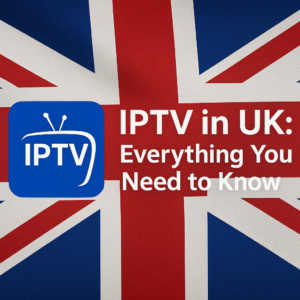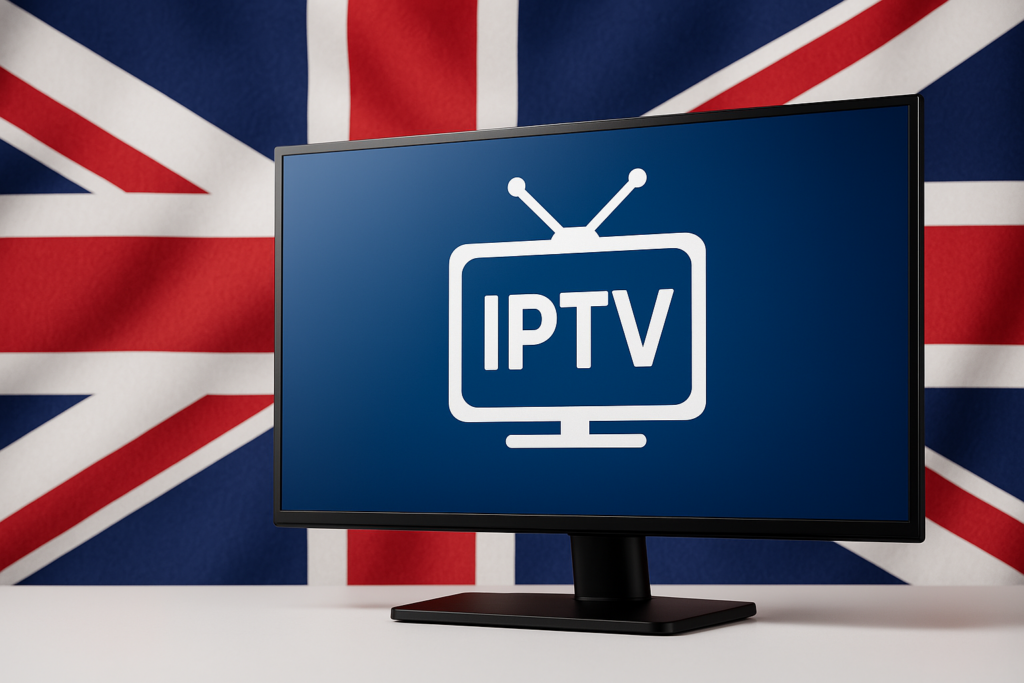A Look at IPTV in the UK
IPTV, or Internet Protocol Television, is the new method of transmitting television content via IP networks such that live television and on-demand content are seamlessly available at one’s disposal on any device with a screen connected to the internet [1]. It gives users an astonishing range of media from live IPTV feeds to hundreds of thousands of movies and series titles just one click away [2]. While traditional cable or satellite TV run over the installed physical infrastructure, IPTV runs over the internet; this definition alone gives room for watching favorite programs anytime and anywhere unprecedented flexibility and personalization [3]. This flexibility further finds expression in pausing, rewinding, or recording live TV so that it provides for modern man’s varied demands on viewing time [4].
The major differences that emerge between IPTV and the conventional means of broadcasting, albeit with some limitations on its strength as a newer technology, are geography-bound cable or satellite transmissions. The latter often necessitates heavy infrastructural compulsions. Huge investments are required in building satellite infrastructures for conventional broadcasting methods. On the other hand, IPTV uses current internet infrastructure, which is available almost everywhere and provisioned for higher video quality because streaming technology has peaked [6]. In addition, it offers personalized services in television viewing since people can choose particular channels or content packages as against the rigid and predefined bundles of the traditional broadcasters.
The take on IPTV in the UK has been on a big upward path, driven by its cheapness, content mix, and the more internet speeds available [8]. Over recent years lots of IPTV sellers have come into the market giving fair prices and different channel choices which has made it more popular [9]. This growth is clear with the rise of ADSL broadband ISP choices making it easier for more homes to get good quality streaming services [10]. Even if IPTV is not likely to fully take the place of old-style broadcasting its part in changing the future of TV in the UK is clear as it keeps on changing with what viewers want and tech upgrades [11].
Different Types of IPTV Services Available
Live TV streaming services have become a staple part of the IPTV market in the UK, offering viewers an ability to watch content across many channels and programs at the time of airing. Unlike traditional means of broadcasting which are constrained by regional availability and timed schedules, live TV streaming services offer a more flexible and diverse menu of options for viewing. Such services typically include very large line-ups of channels both international and regional, along with sports, news, and entertainment. For example, some platforms like ULTRA PREMIUM TV give quite impressive amounts of live TV plus movies and trending programs hence giving them an advantage among other IPTV subscribers. The attractiveness of live TV over the net gets a big boost from its power to provide good quality stream, mostly in HD or even 4K sizes, along with things like electronic program guides, catch-up TV, and cloud DVR options. These give the fact that viewers can watch what they want at their own time better meaning to the whole user experience.
The on-demand content platforms represent another major part of the IPTV service within that growing consumer trend towards wanting a more personalized viewing experience. Essentially, these platforms give consumers access to an enormous library of movies, TV shows, and video content at their convenience-without the shackles of a scheduled broadcast-to tailor their own viewing habits. Services like IPTVukOnline offer over 21,000 channels from all over the world and live sports events in HD and 4K, anti-freeze technology added for non-stopping streaming. The on-demand platforms usually offer strong content libraries with regular updates so the subscribers can have everything about new releases and old titles available to them. Many also provide easy interfaces with personalization based on user behavior which helps users find new content suited to them.
Hybrid IPTV merges the advantages of conventional TV broadcasting with the new Internet-based streaming, creating a viewing solution that satisfies all possible segments of the audience. Combining these two technologies assures hybrid IPTV users’ traditional TV’s reliability and familiarity with the enhanced capabilities of interactive IPTV and on-demand content. This amalgamation would greatly benefit those households where members prefer conventional broadcast accessibility but have started to appreciate the flexibility and wider offerings of Internet-based services. Typically, hybrid IPTV systems offer very wide content menus from live TV to video-on-demand and radio all hooked on a single coherent platform. Such an approach not only maximizes but also simplifies the user experience as it consolidates various services into one. As IPTV tech keeps evolving, hybrid solutions will likely have a bigger place in the UK market meeting the wants of customers who wish for a complete viewing experience.
Legal and Regulatory Setup
The UK IPTV providers’ legal landscape is primarily based on the fact that they have to adhere to very strict licensing requirements. To be legitimate, an IPTV service has to secure licensing agreements with copyright holders for the content it broadcasts [2]. This ensures protection for the rights of intellectual property creators and at the same time makes a clear difference between licensed providers and unlicensed services, which could operate only outside the law. The operation of licensed streaming services within premise laws would be fundamental in promoting fair and competitive markets. Also, these licenses are not just pieces of paper but vital legal documents through which often assure rights protection for both producers and consumers in the digital environment. Of course, this means that IPTV providers have to carefully observe these obligations in their operations to remain compliant.
Besides licensing, all IPTV providers in the UK have to ensure a very wide range of compliance with regulations set by Ofcom, the communications regulator in the UK. These will form the basis for content standards under the Broadcasting Code, ensuring appropriate content on IPTV services and relating to advertising and protection of viewers. For example, regulated IPTV services have to observe the 9pm watershed adult content restriction period [16]. Such regulations go a long way in ensuring that responsible broadcasting environments continue puts consumers protected from inappropriate material aimed mainly at children. In addition to protecting consumers, such compliance enhances credibility among those providing IPTV services.
The regulatory framework on IPTV services in the UK is mainly governed by consumer protection and rights. The government ensures that consumers are protected from illegal services and possible risks like malware, data loss, and identity theft [17]. Protection against fraudulent schemes is ensured since all IPTV providers have to be licensed and comply with the standards of broadcasting. Some of the rights of consumers include expecting a stable and reliable service, which good providers would offer through good content delivery networks (CDNs) [18]. Consumer protection forms an integral part of the secure and equitable IPTV market that users can access legally without being exploited or having their data breached.
Some Well-Known IPTV Services in the UK
UK IPTV has big players who render quality content. ULTRA PREMIUM TV is highlighted for providing long lists of live TV, movies, and popular programs that attract almost everyone. Another important one is IPTV LOGINS which claims to open up a world of entertainment with its premium IPTV subscriptions. These two plus many others in the market bring different sets of channels and content which means that the viewer has access to a very wide spectrum of entertainment options. The presence of such varied providers within the market denotes the competitiveness of the IPTV landscape in the UK.
Every IPTV provider in the UK has something different to offer, which adds value to its subscribers’ viewing experience. For example, availability of 4K streaming is one of the exclusive features attributed to IPTV services that are mostly known for live TV and on-demand content [13]. Providing users with streams that are HD and 4K typically makes the viewing experience much more pleasurable and attractive [21]. In addition, there are some providers who offer customizable channel packages. This gives an opportunity to change the content mix for individual preferences, whether it is international or local content [22]. Such features help these providers stand out in their competition.
Pricing models and subscription options are the last but not least factors that make an IPTV provider attractive. Most of the services have flexible plans that can suit different budgets, hence offering short-term as well as long-term subscription options. For instance, some offer a 3-month subscription at €24.99, 6-month plan at €39.99, and12-month option at €54.99 with a free trial for 24 hours to attract prospective customers [12]. Others probably will offer cheap yearly plans like a 1-year subscription for £59.99 or £89.99 for 2 years with added advantages like having VPN protection and quick activation [23]. The competitive and flexible nature of the available customization subscription plans ensures that they appeal to all the users according to their viewing habits and financial considerations.
Benefits of Using IPTV
One of the biggest benefits of IPTV is its flexibility and convenience for the users. It does not bind the users like traditional cable services; rather, it lets them watch live TV, shows, or movies on demand at any time, giving the option to pause, rewind, or record content [24]. The flexibility also comes in terms of device compatibility as it allows streaming on multiple screens whether they are a smart TV, tablet, or smartphone that provides freedom to watch from almost every place with internet access [25]. This kind of personalized viewing experience is what modern audiences find most attractive and relevant who want to have control over their viewing habits [5].
IPTV also differentiates itself due to its wide access to many channels and content. It offers local and international channels in different languages, which attracts different viewing tastes, and makes sure that there is something for everyone [12]. The quality of the streaming service adds value to the experience as it provides a great variety of IPTV UK channels covering sports, entertainment, and news all under one single platform [26]. Such a wide range of offered content is one major reason for the popularity of IPTV because it satisfies the varied demands of modern cosmopolitan audiences [2].
Besides the flexibility and variety of content, IPTV is mainly appealing because it is cost-effective compared to traditional cable services. Most IPTV providers offer cheap, flexible plans which sometimes are lower than the prices of conventional cable subscriptions; thus, it becomes an inexpensive choice for many homes. Packages start from £12 per month [21], thus not imposing the typical financial burden associated with cable TV while offering a wide range of channels [21]. Its affordability and the great number of channels make IPTV a very attractive option for consumers who are price-sensitive but seek quality in television service.
Tough Spots and Things to Think About
Two very important factors in the UK for streaming IPTV are internet connectivity and bandwidth requirements. A stable high-speed internet connection is a must to ensure smooth and uninterrupted viewing experiences. The quality of the stream, whether SD or HD, directly correlates with the amount of bandwidth consumed. For example, SD streaming typically uses about 500 MB to 1 GB per hour; HD streams use more bandwidth [27]. Choosing a good internet service provider who has adequate speed and where the service is reliable becomes very important for those choosing IPTV [28]. In addition, bitrate which affects video quality needs to be well managed not to cause buffering so that a seamless viewing experience can be achieved [29]. Users should consider a direct ethernet connection avoiding all possible troubles of using wireless connections for best performance [30].
Another major factor that is considered on the use of IPTV services in the UK is service reliability. Users report a generally positive experience with the service; however, there are instances of buffering and interruptions in service. MostOfTheProblemsThatHappenHereOccurDueToTechnicalGlitchesInTheSystem,OverloadOnTheServers,OrInadequateBandwidth. OfCourse, The Issue Will Require Proactivity From Both The Service Provider And The User. For Instance, Using Equipment That Supports High-Speed Internet As WELL AS Having Good Conditions ON The Network Will MUTE Reliability Concerns. Also IMPORTANT IS THE FACT THAT SERVICE PROVIDERS HAVE TO BE KNOWN FOR THEIR CUSTOMER SERVICE AND TECHNICAL ASSISTANCE. IPTV SERVICE RELIABILITY WINS THE VIEWING EXPERIENCE WHEN LIVE EVENTS OR POPULAR SHOWS ARE TELEVISED.
Legal issues and risks of piracy are the primary factors to consider before going for IPTV services in the UK. Legally, many things do not stand a chance in the complex environment of IPTV; thus, many services operate without proper licensing, significantly risking their users [33]. Most unauthorized streaming services fall into significant legal crackdowns, meaning they may face disruptions in service availability due to such oppressions [34]. Another important aspect is that engaging in illegal IPTV streaming can lead to dire legal consequences against individuals, including civil suits and heavy fines [35]. Therefore, consumers must verify that their chosen IPTV service is legally established as it greatly strengthens the operation against piracy networks since most are traceable to organized crime [17]. Whether ethical content delivery can be maintained or not depends on this fact; thus, it should be applied regarding reliability as an information provider.











